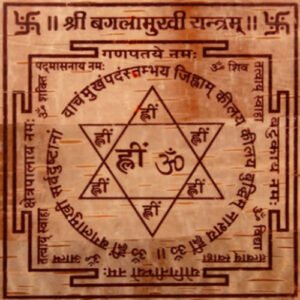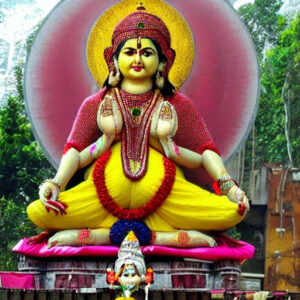Baglamukhi Chalisa, a devotional hymn dedicated to Goddess Baglamukhi, holds significant reverence among devotees of Hinduism. Chalisa, which translates to “forty verses,” is a poetic form of prayer composed in praise of various deities in Hinduism. Baglamukhi Chalisa consists of forty verses or couplets that extol the virtues, powers, and blessings of Goddess Baglamukhi. Reciting or chanting the Baglamukhi Chalisa is believed to invoke the divine grace of the Goddess and bestow devotees with protection, courage, and victory over obstacles.
**Origin and Mythology:**
Goddess Baglamukhi, also known as Pitambara Maa, is one of the ten Mahavidyas, the great goddesses of wisdom in Hinduism. Her name is derived from two words: “Bagla,” which means bridle or rein, and “Mukhi,” which means face. Therefore, Baglamukhi is often depicted as the Goddess who reins in or controls negative forces and enemies.
According to Hindu mythology, the origin of Goddess Baglamukhi is associated with a demon named Madan. Madan had acquired immense powers through severe penance and began misusing them to create chaos and harm in the universe. To protect the world from his tyranny, Lord Vishnu incarnated as Baglamukhi and defeated Madan, thereby restoring balance and order.
**Symbolism and Iconography:**
Goddess Baglamukhi is typically depicted as having a golden complexion, wearing yellow garments, and seated on a throne or lotus flower. She holds a club or mace in one hand and pulls the tongue of a demon with the other, symbolizing her power to silence and subdue negativity. Baglamukhi is often adorned with a garland of skulls, signifying her triumph over death and destruction.
**Significance of Chalisa:**
Baglamukhi Chalisa serves as a potent tool for devotees to connect with the divine energy of Goddess Baglamukhi. Each verse of the Chalisa praises the various attributes and manifestations of the Goddess, invoking her blessings for protection, prosperity, and victory. Devotees believe that reciting the Chalisa with devotion and sincerity can help alleviate problems, dispel fears, and overcome adversities.
**Benefits of Reciting Baglamukhi Chalisa:**
1. **Protection from Enemies:** Goddess Baglamukhi is revered as the protector who can shield devotees from the malevolent intentions of enemies and adversaries. Reciting Baglamukhi Chalisa is believed to create a protective aura around the devotee, safeguarding them from harm.
2. **Removal of Obstacles:** Just as Baglamukhi subdued the demon Madan, chanting her Chalisa is thought to remove obstacles and impediments blocking the path to success and fulfillment. Devotees seek her blessings to overcome challenges and achieve their goals.
3. **Courage and Confidence:** Baglamukhi is hailed as the embodiment of courage and fearlessness. Regular recitation of her Chalisa instills strength, confidence, and determination in the hearts of devotees, enabling them to face life’s trials with resilience and fortitude.
4. **Victory in Legal Matters:** As the Goddess of justice and righteousness, Baglamukhi is invoked for favorable outcomes in legal disputes and court cases. Devotees pray to her for clarity of speech, persuasive abilities, and success in legal proceedings.
5. **Inner Peace and Harmony:** Besides offering external protection, Baglamukhi Chalisa aids in cultivating inner peace and spiritual well-being. The rhythmic recitation of the verses calms the mind, alleviates stress, and fosters a sense of serenity and harmony within.
**Conclusion:**
Baglamukhi Chalisa serves as a powerful devotional hymn through which devotees express their reverence and seek the blessings of Goddess Baglamukhi. Whether recited daily as part of spiritual practice or during times of need, the Chalisa is believed to evoke the divine presence of the Goddess and bestow devotees with protection, courage, and victory over life’s challenges. In the sacred verses of the Baglamukhi Chalisa, devotees find solace, strength, and a reaffirmation of their faith in the benevolence and grace of the Divine Mother.





Your comment is awaiting moderation.
buy nexium 40mg generic – buy topiramate pills for sale buy sumatriptan pills